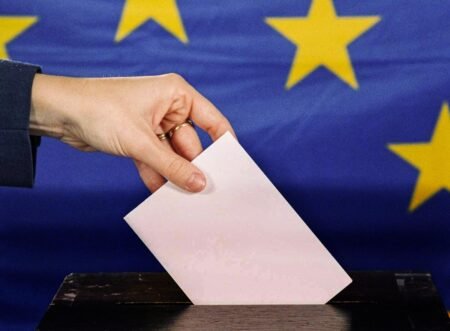(BRUSSELS) – The Commission put forward measures Thursday to tackle fake news online, including a code of practice on disinformation, fact-checkers, and actions to promote quality journalism and media literacy.
The EU executive has moved on the issue ‘to ensure the protection of European values and security’ following the recent Facebook/Cambridge Analytica revelations which demonstrated how personal data can be exploited in an electoral context.
“We are calling on all actors, in particular platforms and social networks who have a clear responsibility, to act on the basis of an action plan aiming at a common European approach so that citizens are empowered and effectively protected against disinformation,” said the Commissioner for Digital Economy Mariya Gabriel: “We will closely monitor the progress made and may propose further actions by December, including measures of regulatory nature, should the results prove unsatisfactory.”
Security Commissioner Sir Julian King added: “The weaponisation of on-line fake news and disinformation poses a serious security threat to our societies. The subversion of trusted channels to peddle pernicious and divisive content requires a clear-eyed response based on increased transparency, traceability and accountability. Internet platforms have a vital role to play in countering the abuse of their infrastructure by hostile actors and in keeping their users, and society, safe.”
The Commission action is based on an independent report published in March 2018 by a ‘High-Level Group on Fake News and Online Disinformation’ as well as wider consultation. The Commission defines disinformation as “verifiably false or misleading information that is created, presented and disseminated for economic gain or to intentionally deceive the public, and may cause public harm”.
A recent Eurobarometer survey finds 83% of respondents saying that fake news represents a danger to democracy. Respondents were particularly concerned by intentional disinformation aimed at influencing elections and immigration policies. The survey also emphasised the importance of quality media: respondents perceive traditional media as the most trusted source of news (radio 70%, TV 66%, print 63%). Online sources of news and video hosting websites are the least trusted source of news, with trust rates of 26% and 27% respectively.
A study by the Commission’s Joint Research Centre on fake news and disinformation points out that two thirds of consumers of online news prefer to access it through algorithm-driven platforms such as search engines and news aggregators, and social media websites. It also states that market power and revenue streams have shifted from news publishers to platform operators who have the data to match readers, articles and ads.
To address these concerns and trends, the Commission is proposing a series of measures to tackle disinformation online. These include:
- A Code of Practice on Disinformation: By July, and as a first step, online platforms should develop and follow a common Code of Practice with the aim of:
- Ensuring transparency about sponsored content, in particular political advertising, as well as restricting targeting options for political advertising and reducing revenues for purveyors of disinformation;
- Providing greater clarity about the functioning of algorithms and enabling third-party verification;
- Making it easier for users to discover and access different news sources representing alternative viewpoints;
- Introducing measures to identify and close fake accounts and to tackle the issue of automatic bots;
- Enabling fact-checkers, researchers and public authorities to continuously monitor online disinformation;
- An independent European network of fact-checkers: this will establish common working methods, exchange best practices, and work to achieve the broadest possible coverage of factual corrections across the EU; they will be selected from the EU members of the International Fact Checking Network which follows a strict International Fact Checking NetworkCode of Principles;
- A secure European online platform on disinformation to support the network of fact-checkers and relevant academic researchers with cross-border data collection and analysis, as well as access to EU-wide data;
- Enhancing media literacy: Higher level of media literacy will help Europeans to identify online disinformation and approach online content with a critical eye.To this end, the Commission will encourage fact-checkers and civil society organisations to provide educational material to schools and educators and organise a European Week of Media Literacy;
- Support for Member States in ensuring the resilience of elections against increasingly complex cyber threats, including online disinformation and cyber attacks;
- Promotion of voluntary online identification systems to improve the traceability and identification of suppliers of information and promote more trust and reliability in online interactions and in information and its sources;
- Support for quality and diversified information: The Commission is calling on Member States to scale up their support of quality journalism to ensure a pluralistic, diverse and sustainable media environment. The Commission will launch a call for proposals in 2018 for the production and dissemination of quality news content on EU affairs through data-driven news media;
- A Coordinated Strategic Communication Policy, drafted by the Commission services, combining current and future EU initiatives on online disinformation with those of Member States, will set out outreach activities aimed at countering false narratives about Europe and tackling disinformation within and outside the EU.
Moving forward, the Commission will now convene a multi-stakeholder forum to provide a framework for efficient cooperation among relevant stakeholders, including online platforms, the advertising industry and major advertisers, and to secure a commitment to coordinate and scale up efforts to tackle disinformation. The forum’s first output is expected to be an EUwide Code of Practice on Disinformation to be published by July 2018, with a view to having a measurable impact by October 2018.
By December 2018, the Commission is due to report on progress made. The report will also examine the need for further action to ensure the continuous monitoring and evaluation of the outlined actions.
Tackling online disinformation - background guide
Factsheet: Tackling the spread of disinformation online
Public Consultation (synopsis report)
Report of the High Level Expert Group on Fake news & disinformation








